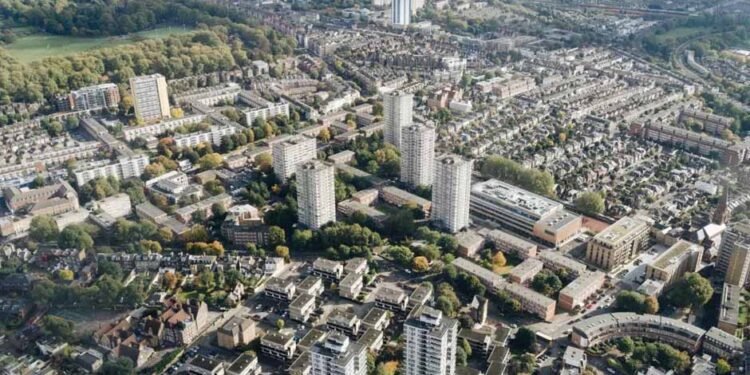In the past few years, there’s been a significant transformation in the global workforce, largely pivoting to remote work – a change vastly propelled by the Covid-19 pandemic. This evolution has reshaped and deeply influenced residential property markets across the globe, with notable impacts in major urban centres, including London.
As of 2023, remote work has become a normalised aspect of professional life. Approximately 12.7% of full-time employees now work entirely from home, while a substantial 28.2% engage in a hybrid model. This paradigm shift is echoed by employers as well.
In London, these global trends are reshaping the residential housing market in unprecedented ways. The city, known for its dynamic urban life, is now at the forefront of adapting to these new life patterns. This article delves into the impact of the remote work revolution on residential real estate in London, exploring changes in location preferences, home office demands, and the broader implications for the city’s housing landscape.
Changes in housing demand and prices in London
With more people working from home, there’s been a noticeable increase in the desire for suitable spaces for home offices. The demand for larger ones with extra rooms or adaptable spaces has risen, as individuals seek comfortable and efficient environments within their living spaces.
The flexibility of remote work has also influenced location preferences. There’s a growing trend of moving away from the city centre to suburbs or even more rural areas. These locations offer larger properties at more affordable prices, appealing to those who no longer need to commute daily. The suburbs around London are experiencing a surge in popularity, as they provide a balance between accessibility to the city and the benefits of more spacious living environments.
The changing dynamics of housing demand and location preferences inevitably impact prices and rental rates. Areas with increased demand are experiencing a rise in property values. Conversely, areas that have traditionally relied on commuters may see a different trend, with adjustments in pricing to reflect the new market realities.
The revolution of remote work is dramatically transforming London’s residential real estate landscape. Its impacts are far-reaching and profound. With this firmly established dominant lifestyle, we anticipate these trends to continue evolving and reshaping the market.
Evolving home requirements in the era of remote work
The landscape of home requirements is rapidly evolving in response to the widespread adoption of remote work. There have been several changes in home design trends:
- Many buyers are seeking properties with dedicated office spaces or flexible spaces that can be easily converted into home offices.
- A top priority is the availability of high-speed internet, crucial for effective remote work.
- Houses with quiet, isolated areas are in high demand, as they are essential for concentration and productivity.
- There’s a heightened interest in good natural lighting and ergonomic features to create a healthier environment.
The trend of remote work is notably impacting how people choose homes and the patterns we see in the property industry. Buyers are increasingly seeking houses that support the lifestyle of working from home, changing how living spaces are designed and advertised. These changes in the housing market are likely to continue and develop further.
New challenges and opportunities in the property market
The shift towards remote work has introduced both challenges and opportunities in the real estate market. Insights from industry reports, such as those from PwC, provide a perspective on these dynamics, particularly in the context of London’s market:
- The demand for properties with specific features like home offices has surged, potentially leading to supply shortages in desired locations and housing types.
- With fewer people commuting to offices, urban areas, especially those heavily reliant on office workers, are experiencing changes. This shift could lead to decreased demand in certain urban real estate markets.
- There are some challenges in pricing clarity due to a decrease in transactions, influenced by the changing work patterns and economic uncertainties.
- High interest rates are expected to persist, affecting both the affordability of mortgages and the overall property investment landscape.
- The decrease in demand for traditional office spaces opens up opportunities for the redevelopment of these spaces. This could include transforming office buildings into residential units or mixed-use developments.
- The new demand for remote-work-friendly homes is encouraging innovation in property design, focusing on flexibility, connectivity, and sustainability.
- Investors and developers are looking at diversifying their portfolios to include properties that cater to the new demands, such as suburban homes with office spaces and those in less densely populated areas.
In conclusion, while the rise of remote work poses certain challenges to the real estate market, it also opens up a range of opportunities. As the market adapts to these changes, we can expect to see a dynamic shift in both the residential and commercial property sectors.
The future of London’s real estate in the remote work era
In the days ahead, the way remote work shapes London’s housing landscape is set to usher in a wave of change, touching everything from the here and now to the distant future. This new culture is rewriting the bond between remote employment and residential property, driving a major overhaul in city design, infrastructure, and the broader real estate sector.
The concept of living spaces will continue to evolve, with a greater emphasis on flexibility, sustainability, and technology integration. Urban planning may increasingly focus on converting underutilised commercial spaces into residential or mixed-use developments. There will be a greater push towards creating sustainable living environments, integrating green spaces, and smart city technologies.
The housing market is showing adaptability and resilience in response to the changes brought by remote work. Developers and investors are exploring innovative solutions to meet the changing needs of the workforce. For those interested in the dynamic landscape of London’s property market, whether it’s for buying, selling, or just staying informed, London.Realestate offers a comprehensive aggregator platform. It provides up-to-date listings, market insights, and valuable resources to navigate the evolving real estate environment in London












